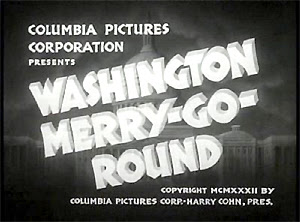 This week we acknowledged Super Tuesday with a selection of politically themed short films on display in our Bijou Mini-Matinee series on YouTube. Click the link under the marquee on the right to enjoy our timely collection of selected short subjects. (Film descriptions follow this post).
This week we acknowledged Super Tuesday with a selection of politically themed short films on display in our Bijou Mini-Matinee series on YouTube. Click the link under the marquee on the right to enjoy our timely collection of selected short subjects. (Film descriptions follow this post).Whenever the subject of political movies comes up, the first titles to surface are usually big budget “A” movies like All the King’s Men, The Manchurian Candidate, The Last Hurrah, The Best Man, Advise and Consent, All the President's Men, Mr. Smith Goes to Washington, The Candidate, Meet John Doe - and the list goes on.
However, many lesser known movies can provide unexpected pleasures and surprising insights into the Matinee at the Bijou world of the 1930s, 40s and 50s. Today we offer up for your consideration our recommendations for a handful of political films whose themes are painted on the American political canvas. Later this election year, we’ll come back with classic film recommendations with international political themes. All of the following can be found (many show up from time to time on Turner Classic Movies) but for some you’ll have to look a little harder.
GABRIEL OVER THE WHITE HOUSE (1933) Newly-elected US President Walter Huston, after an accident, goes from president - to emperor - to dictator in well-intended effort to overcome national depression-era suffering. Republican Louis B. Mayer delayed release of this social satire until Hoover was out of office.
 WASHINGTON MERRY-GO-ROUND (1932) Corrupt congressional politics greets newly minted congressman Lee Tracy - who tackles lobbyists and prohibition-era bootleggers in his determined fight against official waste and corruption.
WASHINGTON MERRY-GO-ROUND (1932) Corrupt congressional politics greets newly minted congressman Lee Tracy - who tackles lobbyists and prohibition-era bootleggers in his determined fight against official waste and corruption. THE SENATOR WAS INDISCREET (1947) William Powell plays an eccentric blowhard Senator with a scandal-rich Washington diary that’s gone missing. Oh yes, he wants to become President in this very funny satire written and directed by George S. Kaufman.
WASHINGTON MELODRAMA (1941) Frank Morgan plays a rich industrialist lobbying congress for wartime favors in this political B-movie melodrama. Morgan wants Congress to approve funding for Nazi victims before America enters the war. Charming Dan Dailey plays a murdering scoundrel.

A FACE IN THE CROWD (1957) Elia Kazan directs Andy Griffith in an awesome performance as Dusty Rhodes, an Arkansas guitar-picking bum who rises to political fame with a little help from Patricia Neal and a lot of help from the new medium of television. Both Andy Griffith and Lee Remick had their screen debuts.
 ROVIN’ TUMBLEWEEDS (1939) It's amazing how many B-western plots revolved around corrupt politicians or businessmen with greedy politicos in their pockets. Gene Autry and Mary Carlisle star and in this one, Autry runs for the US Congress to tackle a corrupt and cynical land baron. Mr. Autry goes to Washington and struggles to pass a flood control bill in this Republic outdoor melodrama with music. Consider the following sample dialog between villain Douglas Dumbrille and the crooked congressman Fuller:
ROVIN’ TUMBLEWEEDS (1939) It's amazing how many B-western plots revolved around corrupt politicians or businessmen with greedy politicos in their pockets. Gene Autry and Mary Carlisle star and in this one, Autry runs for the US Congress to tackle a corrupt and cynical land baron. Mr. Autry goes to Washington and struggles to pass a flood control bill in this Republic outdoor melodrama with music. Consider the following sample dialog between villain Douglas Dumbrille and the crooked congressman Fuller:CF: Did you hear what they said about me in that radio broadcast last night?
DD: Yes, I did hear.
CF: That’s liable to hurt my political career. I’ll sue that station.
DD: You can’t sue anybody for telling the truth.
CF: But, But …
DD: Oh, button your mouth.
CF: But he called me a cheap politician.
DD: What would you call yourself?
YOUNG MR. LINCOLN (1939) and ABE LINCOLN IN ILLINOIS (1940)
Lastly, we call it a tie as to which is the better Abe Lincoln political movie. In the former, John Ford directs Henry Fonda as Abraham Lincoln, and Marjorie Weaver is Mary Todd Lincoln. In the latter, Raymond Massey is superb in an Oscar-nominated performance as Abe, and Ruth Gordon is outstanding as Mary. This one directed by John Cromwell.
Some of these films are as timely as today’s headlines. As we like to say here at The Bijou Blog "Plus ça change, plus c’est la même chose" (The more things change, the more they remain the same.) One of the great things about the internet is that one's pronunciation is always unassailable. Come back next week for another dose of culture!














No comments:
Post a Comment